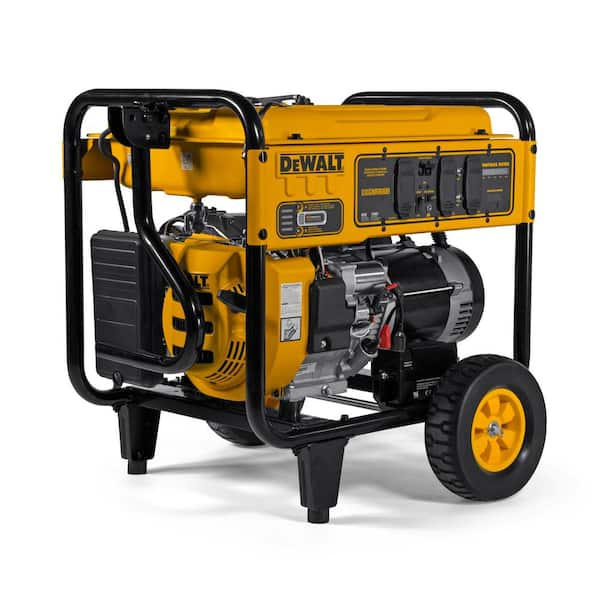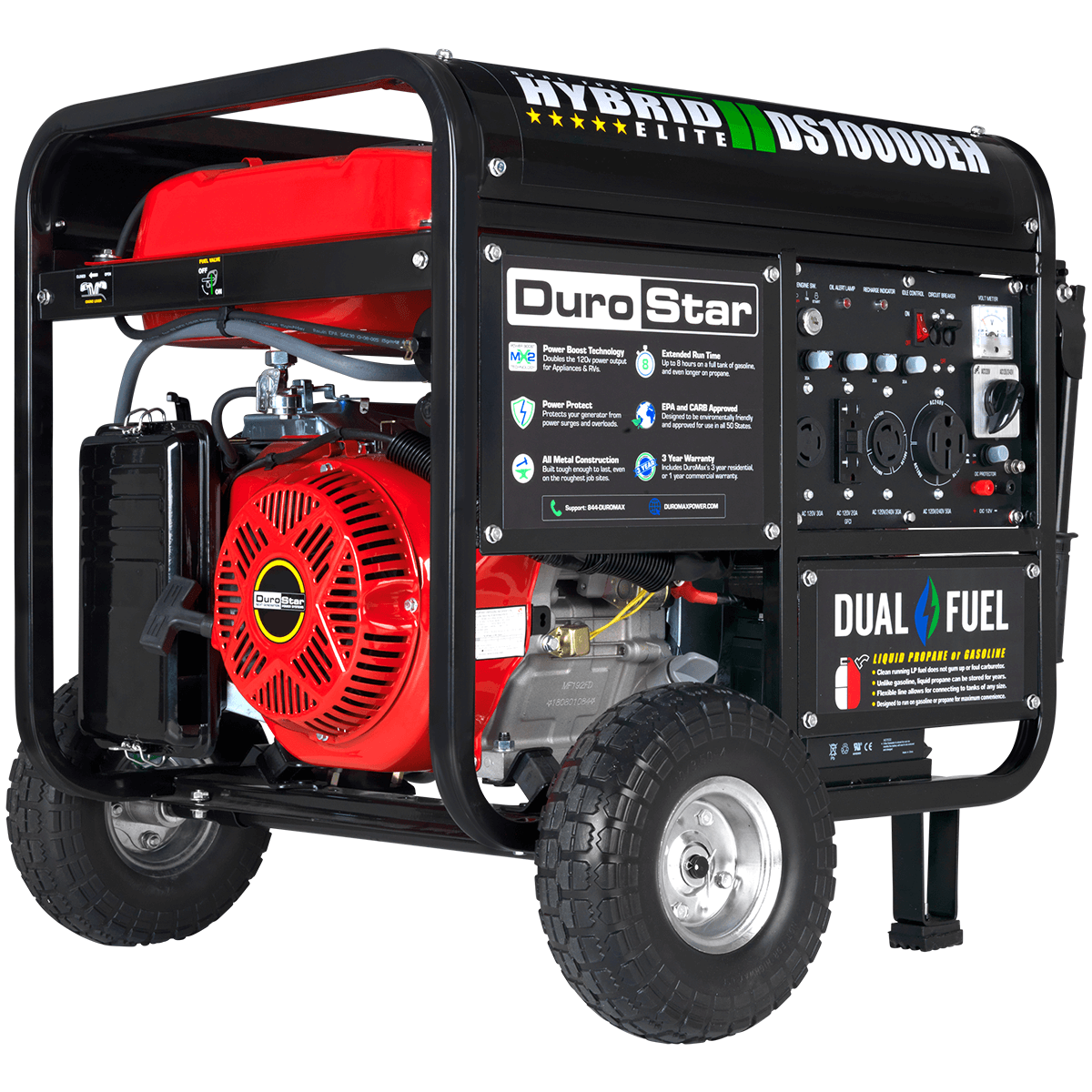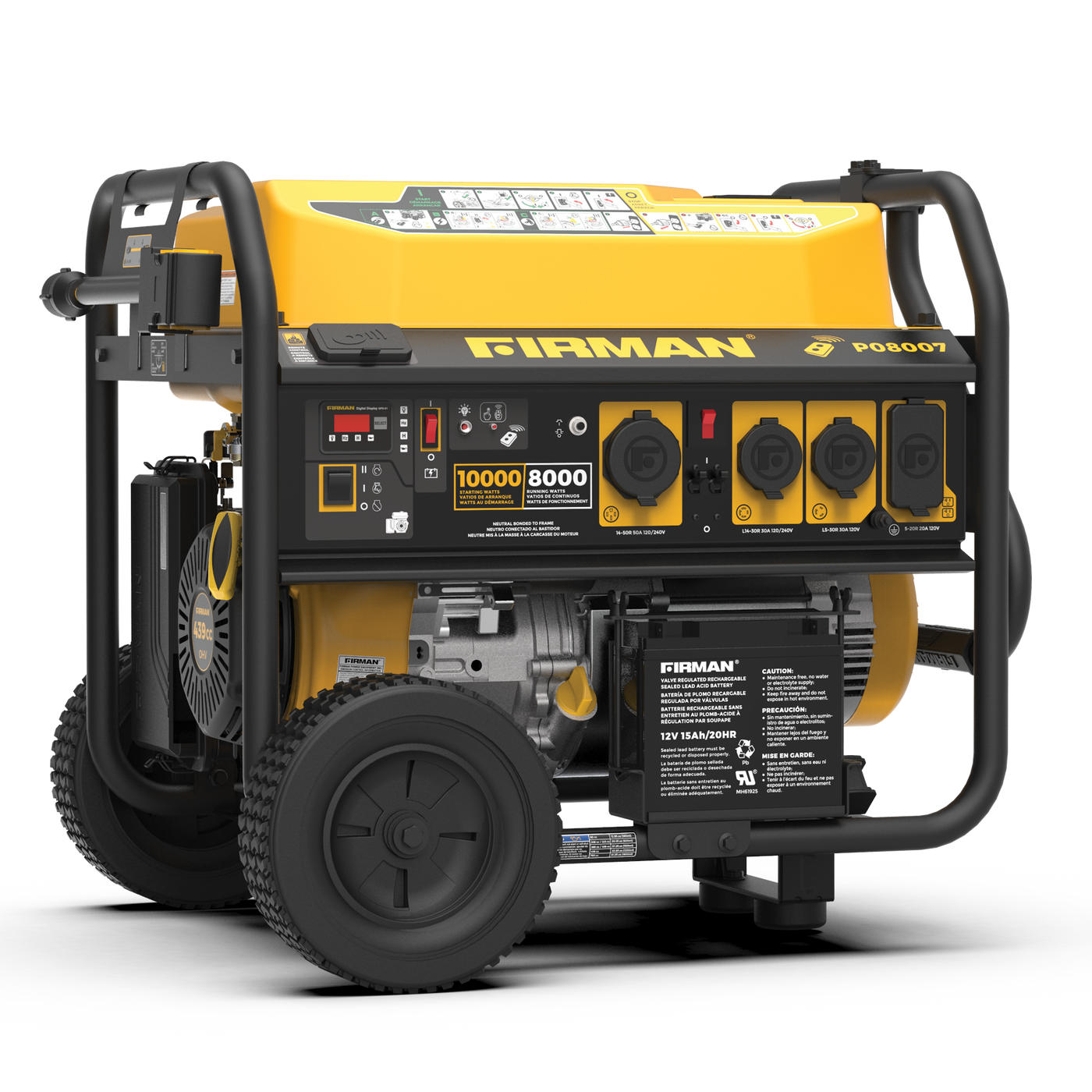Disclosure: This post contains affiliate links and I will be compensated if you make a purchase after clicking through my links. Learn More
A 10,000-watt generator uses about 0.75 to 1.25 gallons of gas per hour. This depends on the load and efficiency of the generator.
Generators are vital during power outages and for outdoor activities. Knowing how much gas a 10,000-watt generator uses helps you plan better. You need to know this for budgeting fuel and ensuring uninterrupted power supply. Whether you use it for home backup, camping, or job sites, understanding fuel consumption is key.
This knowledge helps you manage costs and prepare adequately. We will explore the factors that affect gas usage and provide useful tips for efficient generator use. Stay tuned to learn more about your generator’s fuel needs.

Credit: www.homedepot.com
Introduction To 10,000 Watt Generators
A 10,000 watt generator is a powerful tool. It can provide electricity for many devices. This type of generator is often used in different settings. Understanding its fuel use is important. Knowing how much gas it uses helps in planning and budgeting.
Purpose And Uses
A 10,000 watt generator can power homes during blackouts. It can also support construction sites. These generators are useful during natural disasters. They provide electricity when the main power grid fails. They can run multiple appliances at once. This includes refrigerators, freezers, and lights. They are also used for outdoor events and camping trips. This makes them versatile and valuable.
Importance Of Fuel Efficiency
Fuel efficiency is crucial for 10,000 watt generators. Efficient fuel use saves money. It also extends the generator’s run time. This is important during emergencies. Knowing how much gas a generator uses helps in proper fuel storage. It also reduces the frequency of refueling. A fuel-efficient generator is better for the environment. It emits fewer pollutants. This is beneficial for both users and the planet.
Types Of Fuel For Generators
Choosing the right fuel for your generator is crucial. It impacts efficiency, cost, and environmental impact. Here, we explore the common types of fuel used in generators. Each type has its advantages and drawbacks.
Gasoline
Gasoline is widely available. It is easy to use. Generators running on gasoline are often portable. Gasoline can be expensive. It has a shorter shelf life compared to other fuels. It is highly flammable. Safety is a concern.
Propane
Propane burns cleaner than gasoline. It is stored in tanks. It has a longer shelf life. Propane generators are quieter. Propane may be less efficient. It requires special storage. Accessibility can be an issue in remote areas.
Diesel
Diesel is more efficient than gasoline. It is often used in heavy-duty generators. Diesel fuel is less flammable. It has a longer shelf life. Diesel engines are more durable. Diesel can be expensive. It produces more emissions.
Natural Gas
Natural gas is cost-effective. It burns cleaner than diesel and gasoline. It is available through pipelines. Natural gas generators need a constant supply. They are less portable. Installation can be complex. It is ideal for home standby generators.
Factors Affecting Fuel Consumption
Understanding fuel consumption for a 10,000 watt generator can save money. Several factors influence how much gas your generator uses. Knowing these factors helps in planning and budgeting for fuel costs.
Load And Power Usage
The load on the generator plays a big role in fuel consumption. Higher loads require more power. This means the generator uses more gas. Running multiple appliances at once increases the load. Balancing the load helps in efficient fuel use.
Generator Efficiency
Efficiency varies between different generators. Newer models are often more efficient. Regular maintenance also improves efficiency. Clean filters and tuned engines use less fuel. Checking efficiency ratings before buying a generator is wise.
Environmental Conditions
Environmental factors affect fuel use. Cold weather increases consumption. Generators work harder in extreme temperatures. High altitudes also impact performance. Less oxygen means more gas is needed for the same power output.

Credit: www.duromaxpower.com
Calculating Fuel Consumption
Understanding how much gas a 10,000-watt generator uses is crucial for planning and budgeting. This section will guide you through calculating fuel consumption, ensuring you’re well-prepared for any situation where you need power. We’ll cover the fuel consumption rate, a formula for estimation, and real-world examples to give you a practical grasp of the topic.
Fuel Consumption Rate
The fuel consumption rate is the amount of fuel a generator uses over a specific period. For a 10,000-watt generator, this rate can vary depending on the load and the type of fuel used. Typically, a generator running at 50% load might consume about 0.8 to 1 gallon of gas per hour.
However, this rate can change. Running the generator at full capacity will use more fuel, while a lower load will use less. It’s essential to understand your generator’s consumption rate to plan your fuel needs accurately.
Formula For Estimation
To estimate fuel consumption, you can use a simple formula. Multiply the generator’s fuel consumption rate by the number of hours you plan to run it. For example, if your generator uses 1 gallon per hour at 50% load, and you plan to run it for 5 hours, you’ll need 5 gallons of gas.
Here’s a quick formula for reference:
| Hours of Operation | x | Fuel Consumption Rate (gallons per hour) | = | Total Fuel Needed (gallons) |
|---|---|---|---|---|
| 5 hours | x | 1 gallon/hour | = | 5 gallons |
Real-world Examples
Let’s dive into some real-world examples to make this more relatable. Imagine you have a power outage and need to run your 10,000-watt generator for 8 hours. If your generator’s fuel consumption rate is 0.9 gallons per hour at 50% load, you would need 7.2 gallons of gas.
In another scenario, if you are using the generator for a construction project, running it for 10 hours a day at 75% load, you might see a higher consumption rate, around 1.2 gallons per hour. This means you’d need 12 gallons of gas for a full day’s work.
These examples show how crucial it is to know your generator’s fuel consumption rate. It can save you from unexpected fuel shortages and ensure your generator runs smoothly when you need it most.
Have you ever found yourself unprepared due to miscalculating fuel needs? By understanding these concepts, you can avoid those pitfalls and ensure your generator is always ready to go.
Tips To Improve Fuel Efficiency
Improving fuel efficiency in your 10,000-watt generator can save you money. It also helps reduce the environmental impact. Simple steps can make a big difference in how much gas your generator uses. Let’s explore some effective tips to boost fuel efficiency.
Regular Maintenance
Regular maintenance is key to keeping your generator running efficiently. Clean or replace the air filter. A clean filter ensures proper airflow, which improves fuel combustion. Check the spark plugs and replace them if they are worn out.
This ensures the engine runs smoothly and uses fuel more efficiently. Change the oil as recommended by the manufacturer. Fresh oil reduces engine friction and helps it run more efficiently.
Optimal Load Management
Manage the load on your generator to improve its fuel efficiency. Avoid running the generator at full load all the time. It consumes more fuel. Instead, prioritize essential appliances and devices. This reduces the load and saves fuel. Use energy-efficient appliances.
They consume less power and put less strain on your generator. Spread out the usage of heavy-duty appliances. This helps maintain a balanced load and optimizes fuel consumption.
Using Quality Fuel
Using high-quality fuel can improve your generator’s performance. It burns cleaner and more efficiently. Avoid using old or contaminated fuel. It can clog the fuel system and reduce efficiency. Store fuel in a clean, sealed container to keep it fresh.
Consider using fuel stabilizers. They keep the fuel in good condition, especially for long-term storage. Always buy fuel from reputable sources. It ensures you get clean and high-quality fuel for your generator.
Comparing Fuel Consumption Of Different Models
When comparing the fuel consumption of different 10,000 watt generator models, it’s important to consider various factors. Different brands and models have unique specifications. User reviews also provide valuable insights. This helps to determine the most efficient option.
Brand Comparisons
Popular brands like Honda, Generac, and Champion offer various 10,000 watt generators. Each brand has its own strengths. Honda generators are known for their fuel efficiency. Generac models are praised for their durability. Champion generators often come with advanced features.
Model-specific Data
Comparing specific models helps to see differences in fuel consumption. For example, the Honda EU10000is uses about 0.95 gallons per hour. The Generac GP10000E consumes around 1.2 gallons per hour. Champion’s 100813 model uses approximately 1.1 gallons per hour. These figures can vary based on load and usage.
User Reviews And Feedback
User reviews provide real-world insights into fuel consumption. Many users report that Honda models tend to be more fuel-efficient. Generac users appreciate the balance between power and fuel use. Champion users often mention the advanced features that help manage fuel consumption. Reading user feedback helps to make an informed decision.
Cost Analysis Of Fuel Usage
Understanding the cost analysis of fuel usage for a 10,000-watt generator is crucial. This can help you manage expenses and budget more effectively. By examining short-term and long-term costs, you can make informed decisions. Let’s delve into the details.
Short-term Costs
Short-term costs involve the immediate expense of running the generator. A 10,000-watt generator typically uses around 1 gallon of gas per hour. Gas prices vary, but let’s assume $3 per gallon. Running your generator for 10 hours would cost you $30 in gas. These costs can quickly add up if you need to use the generator frequently.
Long-term Costs
Long-term costs involve more than just the price of gas. Regular maintenance is essential to keep your generator running efficiently. Oil changes, spark plug replacements, and air filter changes are necessary. These maintenance tasks have their own costs, which accumulate over time. Ignoring these tasks can lead to higher repair costs in the future.
Economic Impact
The economic impact of running a 10,000-watt generator goes beyond personal finances. During power outages, businesses may rely on generators to stay operational. The cost of fuel affects the overall expense of running a business. High fuel costs can lead to increased product or service prices. This, in turn, impacts consumers. Understanding fuel usage and costs helps businesses and individuals budget more effectively.

Credit: firmanpowerequipment.com
Alternative Fuel Options
A 10,000-watt generator typically uses about 0. 75 to 1 gallon of gas per hour. Fuel consumption may vary based on load and efficiency. Understanding this helps in planning fuel needs for extended use.
When considering how much gas a 10,000-watt generator uses, it’s essential to explore alternative fuel options. Traditional gasoline isn’t the only choice; there are several options that might be more efficient, environmentally friendly, or cost-effective. Let’s delve into some of these alternatives to find what suits your needs best.
Renewable Energy Sources
Renewable energy sources like solar and wind power are becoming popular. Using solar panels to charge a battery that powers your generator can be a sustainable option.
Wind turbines are another possibility, but they require more space. If you live in an area with ample sunlight or consistent wind, these options can save you money in the long run and reduce your carbon footprint.
Imagine never having to deal with the smell of gasoline again. Renewable energy not only helps the planet but also simplifies your life. Have you ever thought about how much easier maintenance becomes when you switch to cleaner fuels?
Hybrid Generators
Hybrid generators offer the best of both worlds. They can run on gasoline and propane, giving you flexibility.
Propane burns cleaner than gasoline and can be stored indefinitely. This reduces the frequency of fuel changes and maintenance.
Have you ever been in a situation where you ran out of gasoline in the middle of an emergency? With a hybrid generator, you can switch to propane seamlessly. It’s like having a backup plan for your backup plan.
Future Trends In Generator Fuel
The future of generator fuel is exciting and promising. Technologies like hydrogen fuel cells are emerging. These cells produce electricity by combining hydrogen and oxygen, emitting only water vapor.
Another trend is the integration of smart technologies. Imagine a generator that adapts its fuel consumption based on real-time data. It could switch between fuels for optimal efficiency.
Ever wondered what the next big thing in generator fuel will be? Keep an eye on these trends, and you might find a solution that’s not only efficient but also cutting-edge.
By understanding these alternative fuel options, you can make a more informed choice. Which option do you think will work best for you?
Frequently Asked Questions
How Much Gas Does A 10kw Generator Use Per Hour?
A 10kW generator typically uses 1 to 1. 5 gallons of gas per hour. Fuel consumption varies by load and efficiency.
Will A 10,000 Watt Generator Run A Whole House?
A 10,000 watt generator can run essential household items. It may not support all high-power appliances simultaneously.
How Much Fuel Does A Champion 10000 Watt Generator Hold?
The Champion 10000 watt generator holds 7. 7 gallons of fuel. This capacity ensures extended run times for your power needs.
How Long Will 5 Gallons Of Gas Run A Generator?
A 5-gallon gas tank can run a generator for approximately 8 to 12 hours, depending on the generator’s fuel efficiency and load.
Final Words
A 10,000 watt generator uses a significant amount of gas. It’s important to estimate usage for planning purposes. On average, it consumes about one gallon per hour. This can vary based on load and efficiency. Regular maintenance helps improve fuel efficiency.
Always keep extra fuel on hand. Understanding your generator’s needs ensures smooth operation. Proper planning can save you time and money. Make sure to check specifications and user manual for details.








